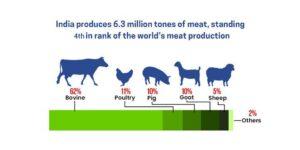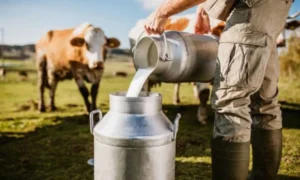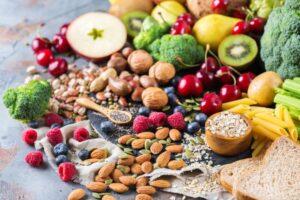Table of Contents
List of All Agricultural Revolutions in India- This article provides information about the major agricultural revolutions in India, highlighting important products and figures. These agricultural revolutions are important for UPSC GS Paper 3, as agriculture plays a vital role in the Indian economy. In the last few years, the Indian government has implemented several initiatives to promote agricultural development. Agriculture remains the backbone of the Indian economy, contributing 19.9% to the GDP in 2020-21.
Agricultural Revolutions in India
An agricultural revolution is a major change in farming, usually due to new inventions in technologies. These changes includes, improved farming methods and increase production. India’s agricultural revolutions have significantly boosted productivity and opened up new opportunities in the sector which is evident from the export numbers, hat India has achieved.
List of Agricultural Revolutions in India
Prominent agricultural revolutions that transformed India from being a net importer to becoming a net exporter and contributing towards the food safety of India are outlined as below, These are important from both the UPSC CSE prelims and GS3 perspective.
| Revolutions | Products | Period | Father of revolution |
| Round revolution | Potato | 1965-2005 | — |
| Green revolution | Food grains (rice and wheat) | 1966-1967 | M.S.Swaminathan |
| Grey revolution | Fertilizers/wool production | 1960s-1970s | — |
| Pink revolution | Prawn or onion production | 1970s | Durgesh Patel |
| White Revolution (also called Operation Flood) | Milk production | 1970-1996 | Verghese Kurien |
| Blue revolution | Fish production | 1973-2002 | Dr. Arun Krishnan |
| Red revolution | Meat or tomato production | 1980s | Vishal Tiwari |
| Yellow revolution | Oilseed production | 1986-1990 | Sam Pitroda |
| Brown revolution | Leather/cocoa production | — | Hiralal Chaudhari |
| Golden fiber revolution | Jute production | 1990s | — |
| Golden revolution | Fruits/Honey/Horticulture production | 1991-2003 | Nirpakh Tutaj |
| Silver revolution | Egg/Poultry production | 2000s | Indira Gandhi |
| Silver fiber revolution | Cotton | 2000s | — |
| Protein revolution | Agriculture | 2014-2020 | Narendra Modi |
| Evergreen revolution | Overall development of agriculture | 2017-2022 | M.S.Swaminathan |
| Black revolution | Petroleum production | — | — |
Agriculture Revolution in India- Important Pointers
The Agricultural Revolution in India brought new farming methods and technologies that helped improve crop production. Here, we will look at the main agricultural changes that took place in India:
Green Revolution
Read here about the Green Revolution in India, which helped the nation to be food secure,
- The main aim of the Green Revolution was to increase agricultural productivity in the developing world with the use of technology and agricultural research.
- The main focus was on transforming India into a modern industrial system through the adoption of technology, such as the use of high-yielding variety (HYV) seeds, mechanized farm tools, irrigation facilities, pesticides, and fertilizers.
- With Green revolution the farmers from Punjab, Haryana and western UP saw huge yields in wheat and rice productions leading to massive profits and providing country sufficient for not only consumption but also for the exports.

Round Revolution
The Round Revolution in India focused on increasing potato production. Potatoes are an important food in India and are eaten by people all over the country. Here’s what happened during the Round Revolution:
- Goal: The main goal was to make potato production much higher — not just a small increase each year, but to double or even triple the amount of potatoes grown.
- Research: The Central Potato Research Institute in Shimla played a big role in this revolution. They helped develop better methods for growing potatoes.
- Results: After the Round Revolution, potato production grew by 14 times more than before.
- Expansion: The revolution aimed to increase potato farming not only in states like Uttar Pradesh, Bihar, and West Bengal but also in other areas where potatoes could be grown.
Grey Revolution
The Grey Revolution refers to the significant advancements in the production and technology of fertilizers to boost agricultural productivity.
- This revolution was started in succession to the green revolution.
- It was started to correct the wrongs done in a green revolution.
- Grey Revolution in India was started in the 1960s to 1970s.
- The main aim of the Grey revolution was to increase the land productivity by bypassing the drawbacks from the green revolution.
- The father of Grey revolution was MS Swaminathan he undertook this to correct and deal with the drawbacks of green revolution.
- It was started to increase fertilizer production in order to increase land productivity.

Pink Revolution
The Pink Revolution focuses on the growth and modernization of the meat and poultry industry, aiming to enhance production, processing, and quality. It plays a key role in boosting food exports and nutrition.
- National Meat and Poultry Processing Board that works under the directives of the Ministry of Food Processing looked over the Pink revolution.
- The pink revolution denotes the technological revolution in the poultry and meat processing sector.
- The revolution includes the creation of meat testing facilities, cold storage for growth, and other infrastructure facilities.
- The present per capita consumption of meat is around 6 grams a day which has the potential to reach 50 grams per day by the next decade.
- Improving the meat and poultry production in India face several challenges like
- Lack of Infrastructure which involves cold storages and modern slaughter houses.
- Standardized policies for export of meat.
- Standardized quality and safety aspects.
- Providing meat testing facilities.
- lack of Increased funds and schemes to improve hygiene.
- Government has taken account of the above challenges corresponding to which steps have been taken like no excise duty and income tax exemption on meat and poultry sector.

White Revolution
The White Revolution, also known as Operation Flood, was a major movement in India aimed at increasing milk production.
- After the huge success of the Green revolution government launched Operation Flood popularly known as White revolution.
- The revolution was associated with a sharp increase in milk production in the country.
- The white revolution period aimed to make India a self-dependent nation in milk production.
- It created a national milk grid linking producers throughout India to consumers in 700+ towns.
- White revolution involved adopting new methods for animal husbandry, and altering the composition of feed ingredients in different proportions.
- Operation Flood was implemented Dr Verghese Kurien, the chairman of the National Dairy Development Board.
- It was possible after the white revolution that India became largest producer of milk and milk products.
- The most important outcome from the white revolution was that it helped in improving rural livelihood and conditions because with the rural co-operatives providing services with the modern management eliminated the middle man and increase profits benefiting the village people.

Blue Revolution
The Blue Revolution refers to the rapid development and growth of aquaculture and fisheries to increase the production of fish and other marine products.
- During the 7th Five-Year plan in between 1985 and 1990 Neel or Nili Kranti Mission was launched for growth of aquaculture sector of India.
- Objectives of Blue Revolution :
- Blue Revolution aims to create an enabling environment for the integrated development of the full potential of fisheries in the country.
- Blue Revolution also aims to substantially improve the income status of fisherman by two folds by improving the post harvest infrastructure which will involve cold storages and ecommerce.
- Tripling the export earnings from the business.
- Improving nutritional values and food security of India.
- Government has taken many steps for success of the blue revolution which involves, promoting and encouraging participation of SC, STs and co-operatives to involve with fishing and encouraging PPP model to take maximum benefit of the private infrastructure.
- India is now 2nd Largest fish producer in the world.
- he fishery has become India’s largest agricultural export over the last five years with a growth rate of 6% – 10%.
- Fisheries contribute to 5% to the Agricultural

Yellow Revolution
The Yellow Revolution refers to the increase in oilseed production, particularly in India, to achieve self-sufficiency in edible oils, read here more about the Yellow Revolution
- The Yellow revolution launched in 1986 to increase the production of edible oil, especially mustard and sesame seeds.
- Sam Pitroda is Known as the father of the Yellow Revolution in India.
- Oil Technology Mission was launched in the year 1986.
- Yellow revolution facilitated the plantation of hybrid mustard and sesame seeds.
- The oil production got doubled within 10 years to 24 million tones from 12 million tones.
- During the early 1990s, an all-time high of 25 million tones of oilseeds was produced from yearly oilseed harvests.
- Steps taken by government include, establishing Oil seed production thrust to promote oil seeds. also National Oilseeds and Vegetable Oils Development Board was responsible for the production enhancement of oilseeds in non-traditional areas.
- Though the production increased to double but still it is not sufficient for India’s consumption needs.
- India majorly imports oil from other countries like Indonesia.
- The energy rich crop are prone to pests because of which the farmers have shifted towards the cash crops and high yielding crops.
- Concluding with the yellow revolution it can be said that to fulfill India’s consumption Yellow Revolution 2.0 is required, aiming to increase the oil production of country.

Protein Revolution
The Protein Revolution emphasized on increasing the production and availability of protein-rich foods, including pulses, dairy, meat, and plant-based alternatives.
- The protein revolution is a technology driven 2nd Green revolution.
- PM Narendra Modi is considered to be father of Protien Revolution.
- The aim of the revolution was to increase the production of Lentis or pulses and curb the issue of malnutrition.
- Steps taken by government :
- set up a Price Stabilization Fund with a corpus of Rs.500 crore to help farmers deal with volatility.
- Kisan TV was started to provide real-time information on new techniques, water conservation, and organic farming.
- Increased funds to 5000 crore for improving warehouse capacity, investment in public infra and private agri startups, modern infrastructure and advancement of agricultural technology.
- Setting up of a National Common Market to help in amending the Agricultural Produce Marketing Committee Act and, hence, establishing private sectors for better services and avoid exploitation of farmers by the cartels.
- providing farmers with soil health cards, laboratories for mobile soil testing and agriculture funds.

Black Revolution
The Black Revolution primarily focused on increasing petroleum production to reduce dependency on imports and strengthen energy security.
- The Black Revolution in India was introduced by the Ministry of Petroleum and Natural Gas with an initiative called the Ethanol Blended Petrol Program in January 2003.
- Objectives of Black Revolution –
- Increased oil production.
- Reduce dependency on foreign imports which is a major reason for Fiscal Deficit.
- The use of biofuel as an alternative to oil, keeping the development sustainable in nature.
- Black revolution includes :
- Infrastructural Development – which involves expansion of pipelines and storage facilities.
- Environment Conservation – As discussed above the revolution aims to use bio fuel maintaining India’s commitment towards the sustainable development.
- Economic Stability – With Black revolution India tends to reduce its dependence on foreign imports and the avoid downgrade of ‘Rupee’ as forex reserves are used in payments of these imports.
- The Black revolution has the following challenges:
- Production constrains – Ethanol is primary bi product of sugar mills, It fulfils only about half of petrol demands. Currently Balrampur Chini Mill is largest ethanol producer in India.
- Limited Sugarcane – The sugarcane is the raw material to produce ethanol, dedicating significant lad to sugarcane production can lead to disturbed crop pattern and inflated food price. Also the sugarcane production will require more ground water disturbing the water table.
- Lack of Alternatives – inedible oil could potentially be converted into biofuel but lacks market.
- India has successfully achieved 20% ethanol blending and is aiming for achieving 50% ethanol blending.

| Related Articles | |
| Indian Islands | Western And Eastern Coastal Plains of India |
| India’s Geographical Extent and Frontiers | Ganga River System |
| Indus Valley Civilization | Satavahanas-Sakas-Kushanas Dynasty |



 TSPSC Group 1 Question Paper 2024, Downl...
TSPSC Group 1 Question Paper 2024, Downl...
 TSPSC Group 1 Answer key 2024 Out, Downl...
TSPSC Group 1 Answer key 2024 Out, Downl...
 UPSC Prelims 2024 Question Paper, Downlo...
UPSC Prelims 2024 Question Paper, Downlo...
